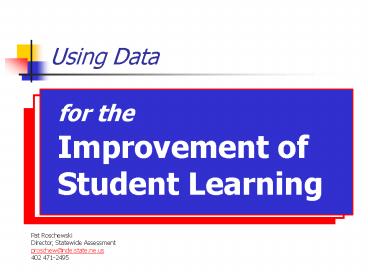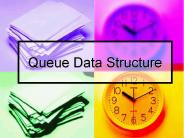Using Data - PowerPoint PPT Presentation
1 / 18
Title:
Using Data
Description:
Collecting and Organizing Data. Analyzing the Data. Connecting Data to ... Organize strategies into a framework for units of study vs. daily lessons ... – PowerPoint PPT presentation
Number of Views:81
Avg rating:3.0/5.0
Title: Using Data
1
Using Data
Pat Roschewski Director, Statewide
Assessment proschew_at_nde.state.ne.us 402 471-2495
2
Using Data for the Improvement of Student Learning
- Role of Data in School Improvement
- Collecting and Organizing Data
- Analyzing the Data
- Connecting Data to Instructional Strategies
- Informing the School Improvement Process with Data
3
What data do we collect?
- Performance on Standards
- Norm-referenced (NRT)
- Classroom-based assessment results
- Statewide Writing Assessment Results
- Demographic Data
- Climate Data
- Discipline Data, Attendance
4
Step 1 Collect and Organize Data
- Understandable Formats
- Easily Communicated
- Readily Accessible
5
Characteristics of Good Data Displays
- Clearly labeled
- Charts and Graphs, not tables and numbers
- Simple, not confusing
- Interpretation/analysis for each data display
6
(No Transcript)
7
(No Transcript)
8
(No Transcript)
9
Step 2Analyzing the Data
- What does the data tell us?
- Factual information
- What might this mean?
- Hypotheses
- What do we do about it?
- Plans for action
10
(No Transcript)
11
- Question Two What might this data mean?
- (Hypotheses)
- Does the assessment measure what we teach?
Why/why not? - How does the timing of assessment impact the
outcomes? - What trends do we see in the data? Why?
- Skill strengths? Weaknesses?
- What differences are there in grade level or
sub-groups? Why?
Reading __________________________________________
__________________________________________________
_________________________________________
Writing __________________________________________
__________________________________________________
_________________________________________
12
(No Transcript)
13
Step 3 Connecting Data to Instructional
Strategies
- Building knowledge about effective instructional
practices - Matching appropriate instruction to skill needs
- Monitoring, supporting, assessing instructional
effectiveness
14
Categories of Instructional Strategies That
Effect Student Achievement
- Identify similarities and differences
Setting objectives and providing feedback
Homework and practice
Generating and testing hypotheses
Nonlinguistic representations
- Summarizing and note taking
Questions, cues, and advance organizers
- Reinforcing effort and providing recognition
Cooperative learning
Marzano, Pickering, Pollock (2001)
15
Planning for Effective Instruction
- Select appropriate strategies for effective
instructions - Organize strategies into a framework for units of
study vs. daily lessons
16
(No Transcript)
17
Reading Standard (4.1.6)
- What skills are required?
- Identify, apply knowledge, provide evidence
- What is the context/content?
- Fiction/literature
- What prior knowledge might be required?
18
Planning Instructional Strategies for Reading
(4.1.6)
- Summarizing and note taking
- Non linguistic representations
- Questions, cues, advance organizers














![5 Big Data Analytics tools [2020] PowerPoint PPT Presentation](https://s3.amazonaws.com/images.powershow.com/9449441.th0.jpg?_=20200605056)
















